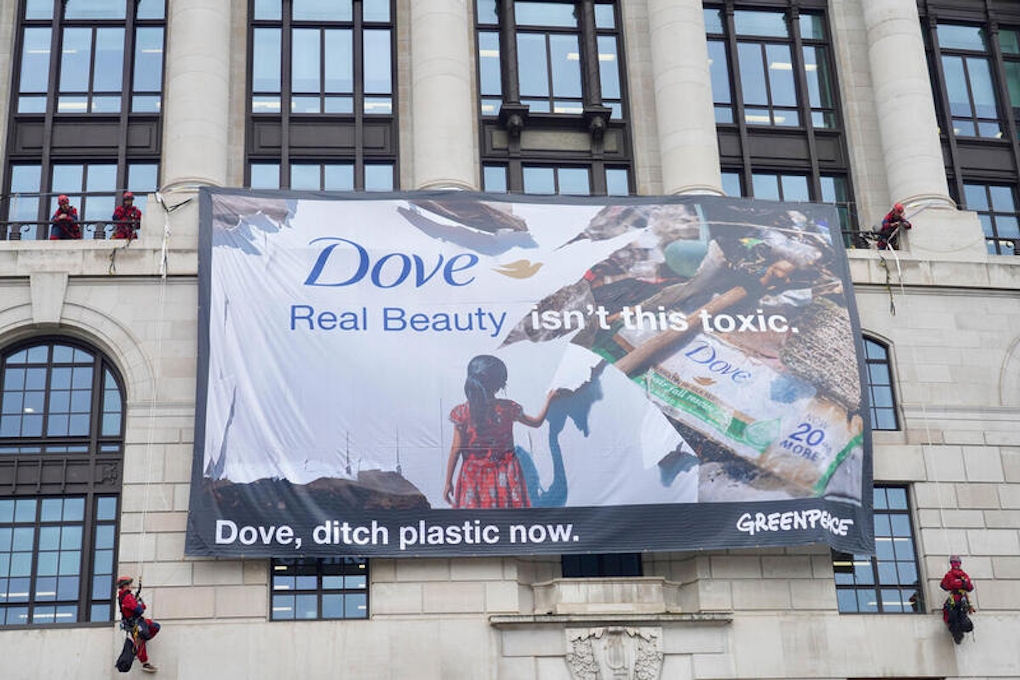Greenpeace slams Dove for the ‘toxic influence’ of its plastic waste
20 years into Dove’s ‘Real Beauty’ campaign, Greenpeace is accusing the Unilever brand of contradicting its message of protecting women and girls by contributing to plastic waste that harms both them and the environment.
Two years ago, Dove released an ad campaign titled ‘Toxic Influence’ that showed mothers and daughters confronting harmful beauty advice that is rampant across social media. It’s an important topic and earned widespread praise for tackling a salient issue and sparking vital conversations.
Now, Greenpeace is pushing that dialogue further, accusing Dove of “hypocrisy” for contributing to plastic pollution, which it argues also negatively impacts women and girls worldwide. To drive this point home, the activist group has released a film that mirrors the Ogilvy-produced ad but with a critical twist.
Directed by Bafta-nominated filmmaker Alice Russell, the video features pairs of mothers and daughters in conversation. Each begins by discussing their positive reactions to Dove’s marketing before they are met with statistics and information about the impact of plastic waste. Russel was joined by Anna Wells as producer, known for her work on Greenpeace’s ‘Wasteminster,’ as well as Sarah Cunningham as director of photography.
Want to go deeper? Ask The Drum
The new project comes after Greenpeace unveiled a ‘Real Harm’ campaign toward the end of last year with a series of outdoor activations right on the doorstep of the Unilever World Headquarters in London. One included a huge bottle of soap with the Dove logo transformed into a dead bird.

Last week, the activists once again took to the streets to shut down the entrances to the building, locking themselves on to barricades made to look like giant Dove products. Climbers unfurled an enormous banner across the building’s facade bearing the message ‘Real Beauty isn’t this toxic’ and called on Dove to ditch plastic.

“Unilever is one of the biggest plastic polluters in the world and it is the biggest seller of these highly polluting plastic sachets, which are causing terrible impacts to communities around the world,” Anna Diski, a plastics campaigner at Greenpeace UK, told The Drum.
“It pumps out 1,700 of them every single second. Dove markets itself as a force for good, pushing this message of female empowerment and care to the planet, but the truth is that it is pumping out tens of billions of pieces of single-use plastic every year. We think this is hypocritical.”
Unilever, in its defense, says its ambition is to end plastic pollution “through reduction, circulation and collaboration.” A spokesperson told The Drum: “We recognize the important role that we play to help make this ambition a reality – which is why plastic is one of our four sustainability priorities.“ (Read the company’s full statement at the bottom of this article.)
Advertisement
Diski claims that while her team has been campaigning this issue for the past 10 months, Unilever has “buried its head in the sand” and “refused to take the action needed” to confront this issue.
Greenpeace has emphasized that it has tried to talk to the FMCG company throughout this process and only launches films, like the one released today, as a last resort.
For the video itself, it was important for the climate activist group to include people who were real Dove customers to garner genuine reactions from them. There was no set-in-stone script, but the participants did know it was a Greenpeace film.
The overall goal was to show hypocrisy, says producer Anna Wells. “The creative was about peeling away its glossy branding, slick marketing and its iconic advertising to reveal the truth that is behind it.
“You’ll see in the middle of the film that we have a rip that shows the contrast between what it describes as real beauty and what we say is the real harm it is causing.”
Greenpeace created the project in-house and painstakingly made it look exactly like the famous Dove ad, frame by frame. The lighting, music and the room had to look familiar if the subversion was going to land with audiences. Greenpeace has invested £80,000 to create the film and injected another £54,000 into advertising it.
Advertisement
Starting tomorrow, the film will be promoted across YouTube, Meta, TikTok and LinkedIn, along with collaborations with influencers. Diski says that this strategy is where Greenpeace has seen Unilever feel the most pressure, likely because Dove also has strong ties with influencers, making it an effective way to reach beyond Greenpeace’s usual audience.
“It was very important for us to match its level of advertising; it’s so slick and amazing,” adds Wells. “We knew that in order for us to cut through, we would have to match its level of quality and make it look like a match.”
Overall, Diski says that Greenpeace wants to “disrupt” Dove’s 20 years of ‘Real Beauty’ celebrations and encourage Unilever to change its ways. “You can’t be celebrating while you’re still poisoning our planet with plastic,” the campaigner states.
“We’re calling on it to phase out single-use plastic from its operations and transition to reusable packaging within 10 years. We’re saying that needs to start with the worst offenders, which are plastic sachets.”
The protest ad comes at a crucial time, with Greenpeace calling on Unilever to advocate for this ambition at the next round of negotiations on a UN Global Plastics Treaty when it attends as co-chair of the Business Coalition in November.
As for any planned protests tomorrow, the pair are keeping tight-lipped but share a smile. “We keep those things top secret.”
Suggested newsletters for you
Unilever’s response
A Unilever spokesperson told The Drum: “Our ambition at Unilever is clear: an end to plastic pollution through reduction, circulation and collaboration. We recognize the important role that we play to help make this ambition a reality – which is why plastic is one of our four sustainability priorities.
“We’ve already reduced our virgin plastic use by 18% and increased our use of recycled plastic to 22%, recognized by the Ellen MacArthur Foundation as one of the businesses making the most progress to reduce its virgin plastic packaging footprint.
“However, our work is far from over. Our updated plastic goals are stretching and focus on the areas that we know will have the most impact, such as continuing to reduce our virgin plastic use and developing alternatives to hard-to-recycle flexible plastic packaging, like plastic sachets.
“We are fully committed to working with industry partners and other stakeholders to develop viable, scalable alternatives that reduce plastic waste. But overcoming a challenge of this scale will require more systemic change. That’s why we’re calling for a UN treaty on plastic pollution that sets legally binding global rules and addresses the full lifecycle of plastic.”

